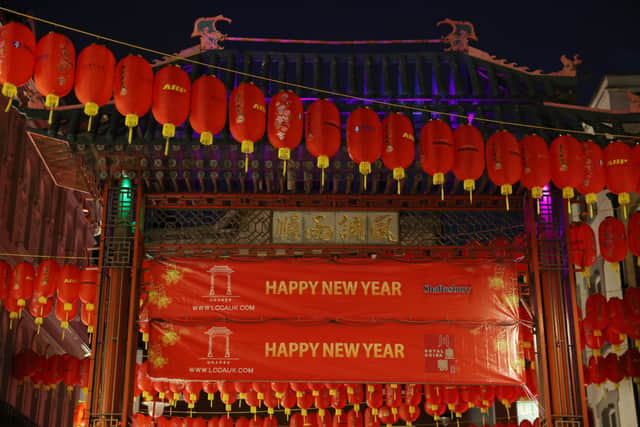How to say Happy New Year in Chinese: 6 ways to say it and meanings behind it
and live on Freeview channel 276
Chinese New Year is only a couple of weeks away, hence revellers have been getting ready for the festivities to start in order to celebrate the year of the rabbit. On 22 January, the new lunar calendar will begin, which means billions of people around the world will be marking the event in some shape or form.
Chinese people also refer to their New Year as the Spring Festival. That’s because shortly after they say goodbye to the old year, they welcome spring in with the new Lunar Year.
Advertisement
Hide AdAdvertisement
Hide AdFrom fireworks to eating dumplings shaped like the moon, as well as sharing red envelopes containing money with family and friends, people in China, Hong Kong, Indonesia, The Philippines, Vietnam, South Korea, Malaysia, North Korea, Singapore, and Brunei will be celebrating a public holiday. But how do we say happy new year to each other in Chinese?
Here is a breakdown of the different greetings:
1. Happy New Year (xīnnián kuàilè) - 新年快乐
This is the standard greeting by any native Chinese person in Mandarin. The direct translation of “Happy New Year” from the Chinese characters is 新年 (xīnnián), which means “New Year” and 快乐 (kuàilè), which is “happy”.


But this word for “happy” is only in the context of speaking to someone else. If you want to say that ‘I am happy’, then 高兴 (gāoxìng, “happy, glad”) is the preferable word. It’s very common to say ‘I am pleased to meet you” when first seeing someone, which is where you would use this word - 很高兴认识你 (hěn gāoxìng rènshi nǐ).
Cantonese: 新年快樂 or “sun nin fai lok”
2. Happy Spring Festival (chūnjié kuàilè) - 春节快乐
The start of the Chinese New Year coincides with the almost the beginning of spring rather than the solar new year in the West. That’s why the New Year is usually referred to as the “spring festival” in Chinese. To wish someone a Happy Spring Festival, you say 春节快乐 (chūnjié kuàilè). In this expression 春节 (chūnjié) means “spring festival” and, 快乐 (kuàilè) means “happy”.
Cantonese: 春節快樂 or “chun je fai lok”
Advertisement
Hide AdAdvertisement
Hide Ad3. Happiness and Prosperity (gōngxǐ fācái) - 恭喜发财
This is a typical saying which is wishing someone happiness, money and respect. It is a very generic phrase and can be used throughout the year, where basically you tell someone “may your special day bring you all the love, happiness and fun”. 恭喜发财 (gōngxǐ fācái) means “happiness and prosperity”, or “I wish you happiness and prosperity (in the new year).” Or “May you have a prosperous year!”
Cantonese: 恭喜發財 or “gong-hey fai-chwhy”
4. Happy year of the Rabbit (tùnián kuàilè) - 兔年快乐
Every new year introduces another animal from the Chinese zodiac and its attributes. Currently, we are in the year of the tiger, but we are about to head into the year of the rabbit. The zodiac system has been going for an estimated 2,000 years and remains central to Chinese culture. People born this year are said to share the rabbit’s characteristics. These include:
- Kind and reasonable
- Quietly confident and resilient
- Scholarly
- Careful
- Strong attention to detail
With that in mind, it is customary to add the animal first to the greeting hence 兔年 (tùnián) literally means ‘rabbit year’. And as mentioned earlier, you add 快乐 (kuàilè), which is “happy” to the end of the expression.
Cantonese: 兔年快樂 or “to nin fai lok”


5. Best wishes (wànshì rúyì) - 万事如意
This means ‘may everything go well with you’ or it is similar to the idea of writing ‘best wishes’ at the bottom of a greeting card. 万 (wàn) or ‘ten thousand’ is not commonly used for its actual meaning. You are more likely to see it translated as “loads” or even “everything”. Whilst 事 (shì) means “matter” or “thing”. As a result, it often means ‘In all your matters’ or ‘in everything you do may it go well this year’. And lastly, 如意 (rúyì) is often used together, as “according to one’s wishes” or “how you want”.
Cantonese: 萬事如意 or “mahn si yuh yi”
Advertisement
Hide AdAdvertisement
Hide Ad6. Wish you luck every step of the way (bù bù gāo shēng) - 步步高升
This particular idiom is more like a blessing. The definition of 步步 (bù bù) is ‘step-by-step’, whilst 高升 (gāo shēng) means to ‘increase’ or ‘upwards’, hence altogether it can be translated as ‘wishing you luck every step of the way in your rise to prominence’.
Cantonese: 步步高陞 or “boh-boh goh-sshin”
Comment Guidelines
National World encourages reader discussion on our stories. User feedback, insights and back-and-forth exchanges add a rich layer of context to reporting. Please review our Community Guidelines before commenting.
